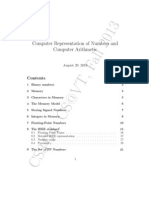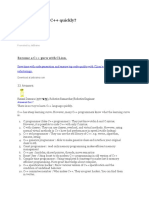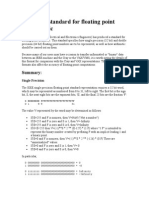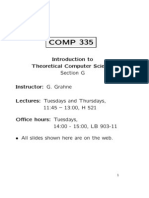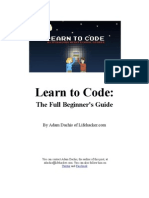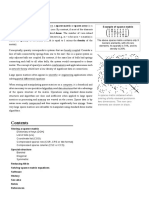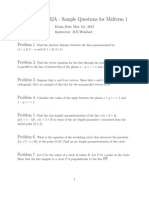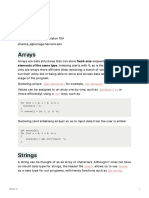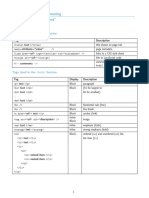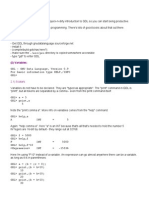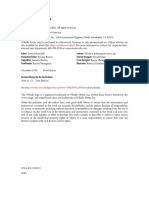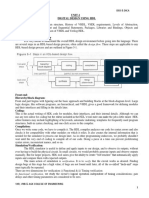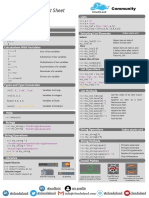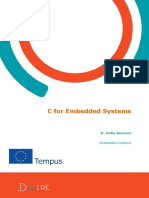C Cheatsheet FUNCTIONS
A function is a pointer to some code, parameterized by formal parameters, that
The single best book on C is The C Programming Language by Kernighan and Richie. may be executed by providing actual parameters. Functions must be declared before
they are used, but code may be provided later. A sqrt function for positive n
CODE: might be declared as:
Source Code that does work goes into files with ".c” suffix. double sqrt(double n) {
Shared declarations’s (included using #include "mylib.h”) in "header” files, end in ".h” double guess;
COMMENTS: for (guess = n/2.0; 0.001<abs(n-guess*guess);
Characters to the right of // are not interpreted; they’re a comment. guess = (n/guess+guess)/2);
Text between /* and */ (possibly across lines) is commented out. return guess;
DATA TYPES: (32 bit mode) }
name size description This function has type double (s*sqrt)(double).
char 1 byte an ASCII value: e.g. ‘a’ (see: man ascii) printf("%g\n”, sqrt(7.0)); //calls sqrt; actuals are always passed by value
short 2 bytes a signed integer up to 16,567 C:Functions parameters are always passed by value. Functions must return a value.
int/long 4 bytes a signed integer up to 2,147,483,648 The return value need not be used. Function names with parameters returns the
long long 8 bytes a signed integer up to 9,223,372,036,854,775,807 function pointer. Thus, an alias for sqrt may be declared:
float 4 bytes a floating point (approx. to real) number double (*root)(double) = sqrt;
double 8 bytes a higher precision floating point number printf("%g\n”, root(7.0));
Procedures or valueless functions return ‘void’.
char, int, and double are most frequently and easily used in small programs
There must always be a main function that returns an int.
sizeof(double) computes the size of a double in addressable units (bytes)
int main(int argc, char **argv) OR int main(int argc, char *argv[])
Zero values represent logical false, nonzero values are logical true.
Program arguments may be accessed as strings through main’s array argv with argc
Math library (#include <math.h>, compile with -lm) prefers double. elements. First is the program name. Function declarations are never nested.
CASTING: KEY WORDS
Preceding a primitive expression with an alternate parenthesized type converts or
unsigned makes unsigned integer types.
"casts” value to a new value equivalent in new type:
extern in a .h file, says data is defined elsewhwere
int a - (int) 3.131; // Assigns a=3 without complaint
C++: int a = static_cast<int>(3.131);
static in a .c file: value can't be seen outside. Initialized once.
Preceding any other expression with a cast forces new type for unchanged value. typedef before declaration defines a new type name.
double b = 3.131;
enum { gives integers meaningful names.
int a = *(int*)&b; //interprets the double b as an integer (not necessarily 3)
C++: int a = reinterpret_cast<int>(3.131); red,
OPERATIONS: green,
+ - * / % Arithmetic ops. /truncates on integers, % is remainder.
orange
++i --i Add or subtract 1 from i, assign result to i, return new val
}
i++ i-- Remember i, inc or decrement i, return remembered value
ARRAYS and POINTERS and ADDRESS COMPUTATION
Arrays indicated by right associative brackets ([]) in the type declaration
&& || ! Logical ops. Left side is not executed if right side is enough.
int a[10]; //a is a 10 int array. a[0] is the first element. a[9] is the last
&| ^ ~ bit logical ops: and, or, exclusive-or, invert
char b[]; //in a function header, b is an array of chars with unknown length
>> << Shift right and left: int n=10; n<<2 computes 40
int c[2][3]; //c is an array of 2 arrays of three ints. a[1][0] follows a[0][2]
= Assignment. Result is the value assigned. Array variables (e.g. a,b,c above) cannot be made to point to other arrays
+= -= *= etc Short for a = a + <any>; etc. Strings are represented as character arrays terminated by ASCII zero.
== != < > <= >= Comparison operators C++: you write these for your types. Pointers are indicated by left associative asterisk (*) in the type declarations:
?: expression version of if: (x%2==0)?"even":"odd" int *a; //a is a pointer to an integer
, ell evaluated, value is last: a = (b,c,d); exec’s b,c,d then a=d char *b; //b is a pointer to a character
STATEMENTS int *c[2]; //c is an array of two pointers to ints (same as int *(c[2]);
Angle brackets identify syntactic elements and don’t appear in real statements int (*d)[2]; //d is a pointer to an array of 2 integers.
<type> <name> = <expression>; // declares a variable and gives it a value.
<name> = <expression>; // changes the value of a variable. Pointers are simply addresses. Pointer variables may be assigned.
<expression> ; //semicolon indicates end of a simple statement Adding 1 computes pointer to the next value (by adding sizeof(X) for type X)
break; //quits the tightest for,while or switch adding integers to a pointer (even 0 or negative values) behave in the same way
continue; //jumps to next loop test, skipping rest of loop body
return x; //quits this function, returns x as value The ampersand (&) operator gives you the address.
{ <stmt><stmt>… } //curly-brace groups statements into 1 compound (no ; after) An array without an index or a struct without field gives you the address:
if (<condition>) <stmt> //statement evaluated if condition is non-zero. int a[10], b[20]; // two arrays
if (<condition>) <stmt> else <stmt> // else part evaluated if condition is false. int *p = a; // p points to first int of array a
while (<condition>) <stmt> // stmt repeatedly evaluated if condition is non-zero. p = b; // p now points to the first int of array b
An array or pointer with an index n in square brackets returns the nth value:
do <stmt> while (<condition>); // note semicolon. stmt eval'ed at least once.
int i = a[0]; // i gets the first value of a
for (<init>; <condition>; <step>) <stmt>
i = *a; //pointer dereference: i gets the first value of a
switch (<expression>) {
p = a; //because a is an array: same as p=&a[0]
case <value>: <stmt> // evaled if <expr> equals value;
p++; //same as p=p+1; same as p=&a[1]; same as p=a+1
break; // and break out of the switch statement.
Bounds are not checked. You are responsible. Don't access outside the array.
case <value2>: <stmt2> // falls through to next case.
COMPILING:
case <value3>: <stmt3> break;
gcc prog.c # compiles prog.c into a.out run result with ./a.out
default: <stmt4> // if nothing else matches. Can be anywhere in switch
gcc -o prog prog.c # compiles prog.c into prog; run result with ./prog
break;
}






